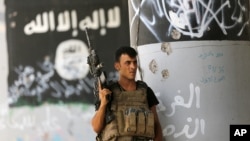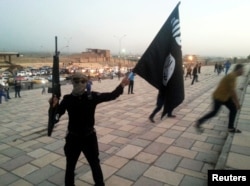Known as Islamic State, the group of hard-line jihadists that once dominated large areas of Iraq and Syria is infamous for its sheer brutality, including beheadings, drownings, burning people alive, rape, and the promotion of slavery.
Initially a largely Sunni Arab group, IS grew out of the terrorist organization known as al-Qaida in Iraq (AQ-I) led by Jordanian Abu Musab al Zarqawi in 2004. AQ-I fed off the deep sense of Sunni disenfranchisement after the United States decided to disband the Iraqi army and Saddam Hussein's powerful Ba'ath party.
AQ-I began terrorizing the Iraqi population, both those Sunnis who refused to join them and Shi'ites, bringing the country to the brink of civil war in 2006-7. Sunni Arab tribal leaders, tired of the brutality, finally turned their back on the group in 2007 during the U.S.-backed "Awakening."
Zarqawi was killed in a U.S. airstrike, and for a while there appeared to be peace in Iraq. But AQ-I had merely gone underground, and it soon emerged again under the leadership of Abu Bakr al Baghdadi.
A former U.S. detainee in Iraq, Baghdadi discarded al-Qaida as too meek, and channeled his radical ideology into creating Islamic State.
The group flourished under Iraq's sectarian Shi'ite led governments and also rapidly gained power and territory in the war-created power vacuums in neighboring Syria under the name al-Nusra.
Internal divisions led al-Nusra to formally split with IS in April 2013 and pledged its allegiance to al-Qaida. But IS maintained a strong presence in Syria, capitalizing on an unprecedented flow of tens of thousands of foreign fighters to join the conflict.
In 2014, IS declared its "caliphate's capital" in Raqqa, Syria, and launched a major military push across Iraq, seizing the key cities of Mosul, Ramadi, and Fallujah.
Baghdadi has called for Muslims around the world to recognize its supreme authority, and exploited its brutal notoriety to launch an international social media campaign to recruit new fighters and to expand it's self-declared caliphate, claiming provinces in at least nine countries across the Middle East, North Africa and South Asia.
Western intelligence officials say IS has also created a well-developed external operations wing with cells in Europe, blamed for carrying out high-profile attacks in Paris and Brussels, while enabling and inspiring terror attacks from the United States to Southeast Asia.
The U.S. fight against both AQ-I and IS has spanned two administrations, but ramped up in 2014 after shocking scenes of IS militants beheading American citizens, mass executing Iraqi soldiers and civilians, and capturing and enslaving thousands of Yazidi women.
U.S. military officials say about 45,000 IS fighters have been killed in the past two years as the militant group has steadily lost ground in Iraq and Syria. But the U.S. intelligence community estimates the group can still muster 18,000 to 22,000 fighters in the conflict zone.
There are also concerns that the underlying local political and sectarian grievances that allowed the group to take hold in Iraq and Syria have yet to change, and that even if IS loses its self-declared caliphate it will persist both as an insurgency and as a global terror threat.







